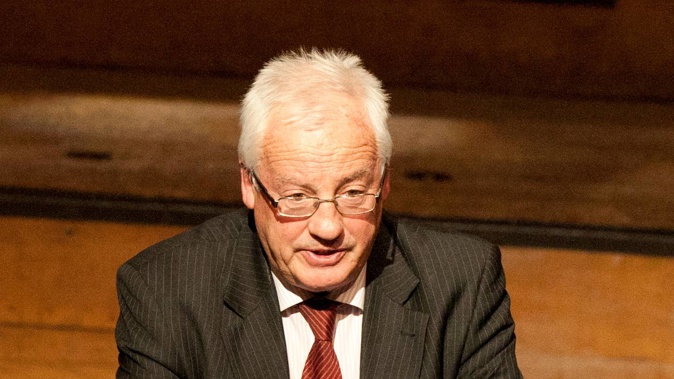
A leading figure of New Zealand's judiciary appointed to a Dubai judges role quietly resigned just weeks into the job after mounting pressure from human rights campaigners.
Sir William Young, a former Supreme Court judge who led the Royal Commission of Inquiry into the March 15, 2019 Christchurch terror attack, stepped down less than a fortnight after joining Dubai's international financial court.
Two Irish judges virtually sworn in alongside Young on July 27 to the Dubai International Financial Centre (DIFC) Courts - the republic's former chief justice, Frank Clarke and former High Court president Peter Kelly - resigned after pressure from a leading politician who said their appointments were part of a "deliberate strategy by … [the] regime to use respected former judges as a way to legitimise it".
/cloudfront-ap-southeast-2.images.arcpublishing.com/nzme/EQXGK527XKBZTMAG7WXTYDXRUI.jpg)
New Zealand judge Justice Sir William Young is sworn in as a judge of the Dubai International Financial Centre Courts in a virtual ceremony on July 27. Photo / Supplied
Amnesty International claims that the United Arab Emirates (UAE) government continues to commit serious human rights violations, including its courts passing death sentences.
The 70-year-old Young, who lives in Christchurch and retired from the bench of the Supreme Court earlier this year after 25 years as a judge, had been listed on the DIFC's website as one of its judges, alongside high-profile figures from England and Wales, Scotland, Australia, Malaysia and the UAE.
But his photograph and details vanished from the site earlier this week.
After inquiries from the Herald, Young confirmed that he has stepped down.
/cloudfront-ap-southeast-2.images.arcpublishing.com/nzme/H4E7F4TMHPX222ZJ3YUSWO6WWA.jpg)
Justice Sir William Young appeared on the DIFC Courts' official website but has since been taken down, along with several international colleagues. Photo / Supplied
He said he was first approached to consider the position late last year.
Young said he was pleased to accept the appointment, believing that the DIFC Courts played a valuable role in providing "independent, impartial and efficient resolution of commercial disputes for those who seek redress through them".
"They are credited with providing a stable legal environment, and predictable outcomes in which business can be done. Impartial and efficient adjudication of commercial disputes is in the public interest wherever it occurs," Young said today.
However, the criticism of the appointments of the Irish judges, and the "concerns that underlie that criticism", made Young rethink his decision, he said.
"Underlying the criticisms are issues of perception: how sitting as a judge on the DIFC Courts may be seen by others. As an acting judge in New Zealand, I concluded that I could not brush aside the possibility of such adverse perceptions and any controversy they may lead to," he said.
"I therefore decided to resign from the DIFC Courts and did so by email to the Chief Justice of the DFIC Courts on August 9."
The resignation was received with "polite regret", he said.
New Zealand's Chief Justice approved Young holding office as a judge of the DIFC Courts pursuant to section 142(2) Senior Courts Act 2016.
Section 142(2) of the Senior Courts Act provides that if a judge is to hold any other office, it must be with the approval of the Chief Justice who must be satisfied that holding such office is consistent with the judge's judicial office in New Zealand. The Chief Justice's assessment was that the appointment was consistent with judicial office.
/cloudfront-ap-southeast-2.images.arcpublishing.com/nzme/FYOXU7BOA423YLHXVML53MK3Z4.jpg)
Justice William Young joined the Supreme Court in 2010. Photo / Supplied
Human rights activist and retired Irish barrister Bill Shipsey, who has been outspoken in criticising judges for signing up to the Dubai jobs, praised Young for making a "courageous decision" to step down.
Shipsey wrote in the Irish Times earlier this month asking "what were they thinking" given what he calls Dubai's "appalling human rights record and the conduct of their appointer, the Ruler of Dubai, Mohammed Al Maktoum".
Within four days of his column, both Irish judges had resigned.
When he stepped down, Kelly said in a statement: "I have decided to resign from the Court of Appeal of the DIFC since, as a private citizen, I do not want this controversy to disrupt my future time in retirement."
The DIFC is yet to make any public comments around the resignations.
The appointment of high-profile respected judges has been branded "judge washing", which has been likened to "sports washing" - a term popularised by Amnesty International to describe the use of sports by oppressive governments to legitimise their regimes and distract from their human rights abuses, including the LIV Golf tour - an upstart league backed by the Saudi government to compete with the established PGA Tour by attracting top players with prize purses worth tens of millions.
The Herald understands that the Dubai court has been reluctant to share the oath that the judges are required to take.
And it's not known how much the judges are being paid.
Young, who graduated from the University of Canterbury in 1974 and later gained a doctorate from Cambridge University, was appointed a Queen's Counsel in 1991. He was made a High Court judge in 1997 before the Court of Appeal before becoming a judge of the Supreme Court in 2010.
- Kurt Bayer, NZ Herald
Take your Radio, Podcasts and Music with you









